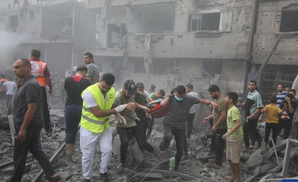IANS Photo

Gaza, November 29 (IANS): Director-General of the World Health Organization, Tedros Adhanom Ghebreyesus on Wednesday said that overcrowding, lack of food, water, sanitation and basic hygiene are hastening the spread of disease in Gaza.
In a lengthy post on X, the WHO chief said that 1.3 million people are currently living in shelters in Gaza, where a humanitarian pause reached between Israel and Hamas is currently underway.
"Overcrowding and lack of food, water, sanitation and basic hygiene, waste management and access to medication are resulting in a high number of cases of acute respiratory infections (111,000), scabies (12,000), lice (11,000); diarrhoea (36,000), skin rash (24,000), impetigo (2,500), chickenpox (2,500); jaundice (1,100)," he said.
Ghebreyesus went on to say that on top of all this, there was "heightened risk of disease outbreaks".
"Given the living conditions and lack of health care, more people could die from disease than bombings. We need a sustained ceasefire. Now. It's a matter of life or death for civilians," the WHO chief added.
Due to the overcrowding and poor sanitary conditions at UN Relief Works Agency (UNRWA) shelters in Gaza, there have been significant increases in some communicable diseases and conditions such as diarrhoea, acute respiratory infections, skin infections and hygiene-related conditions like lice.
There are also initial reports of disease outbreaks, including Hepatitis.
According to the UNRWA, the war has displaced up to 1.8 million people in Gaza, or nearly 80 per cent of the population.
Nearly 1.1 million IDPs are currently registered in 156 UNRWA facilities across Gaza.
Another 191,000 internally displaced persons are estimated to be staying in 124 public schools and hospitals, as well as in other venues such as wedding halls, offices, and community centres.
On Tuesday, the Gaza city municipality had warned of the health and environmental ramifications of the accumulation of more than 35 tonnes of solid waste in the city.
The solid waste cannot be transferred to the main landfill located in the vicinity of Gaza’s perimeter fence, due to prohibition by the Israeli military, the municipality said.
Meanwhile, concerns about dehydration and waterborne diseases persist due to water consumption from unsafe sources.





